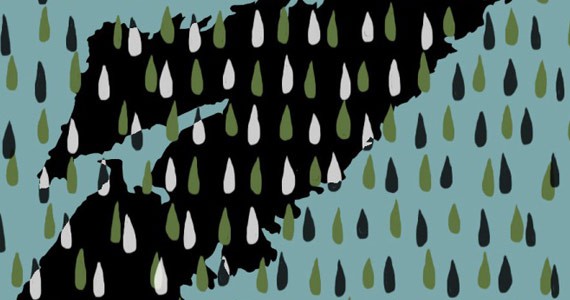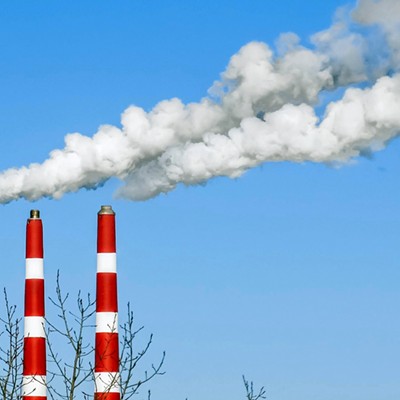In the 1980s, acid rain was a wake-up call. The idea that the sky could open up and rain poison on us, and it was our own fault for being energy pigs---it's mainly caused by sulfur and nitrogen compounds from electricity production, cars and factories---was a shocker.
Acid rain's impacts were obvious. It killed animals and plants and corroded human infrastructure. Its potential for ecological destruction was such that industries and governments wasted no time creating cleaner technologies, economic incentives for using them, penalties for ignoring the problem and well-funded scientific monitoring programs to measure the results.
But the problem isn't solved yet. Especially if you live here. Tom Clair, an ecologist and environmental chemist at Environment Canada's Dartmouth office, has figured out why Atlantic Canada is hit with some of the lowest amounts of acid rain, yet has some of the most acidic fresh water in North America.
"We've had acid rain in Nova Scotia for more than 100 years and it's accumulated in our soil, which doesn't have a lot of buffering materials like limestone," Clair says. "It's clay, and there's acidity all through the system. Although we've reduced acid rain 50 percent since the '70s, it's not changing the acidity of Nova Scotia lakes and rivers."
That's not new information, but Clair determined that aluminum plays a much larger role in Nova Scotia's freshwater woes than previously thought. In an October paper, he writes that "improved techniques for its measurement have been developed." He was the first to use those techniques to measure how acid rain affects aluminum levels in our rivers and streams.
Clair's team sampled 97 salmon rivers in Nova Scotia, New Brunswick and Newfoundland. They found that the southwestern portion of our province, which has experienced the worst losses of salmon populations, has seven rivers with aluminum in quantities toxic to aquatic life.
Prior to this research it was believed that organic materials neutralized the aluminum. But without a buffer, acid rain "liberates aluminum" in the soil and water. "It's everywhere like the holy spirit," Clair says. "We have lots of carbon in the water but the pH is so low [acidic] that lots of free aluminum is also present. Our rivers are acidic and high in toxins; the fish don't have a chance."
Some of southwestern Nova Scotia's waters have low pH levels and aluminum concentrations as high as 30 milligrams per litre, twice the level that seriously harms fish. "Fresh waters in parts of the province won't return to pre-acid levels for a hundred years or more," Clair says, "even if we reduce acid-rain emissions to zero."
Conservationists are trying to accelerate the recovery in some areas by applying crushed limestone by the tonne, to move the pH levels back toward a neutral 7. Clair isn't confident. "It's a big area; you can't lime everything," he says. "It's a stop-gap measure." The long-term solutions, he says, are continued reduction in emissions of sulfur and nitrogen compounds, and time.
Acid rain was one of the planet's early demonstrations that our actions have consequences. The half-empty view is that nature is going to kick our asses hard for what we've done to it. The half-full view is, we were given a warning and reacted well, fostering cross-border and cross-sector human cooperation at its best to ward off a serious threat. As a result, our fresh waters and their aquatic life will eventually recover from 200 years of suffering.
The irresistible comparison is global warming, something immeasurably more complex and subtle than acid rain. Like acid rain, this phenomenon has been ongoing since the industrial revolution, with rapid increase in the last century, and was first scientifically observed in the '70s. Yet it's harder to point to a dead fish and say, "global warming did that." Instead, we have trends---rising shorelines, increasing frequency of severe storms and droughts.
With acid rain, we saw, we acted. The problem is not solved, we still suffer the fallout, but it seems to be well in hand. Will we be able to say that about global warming before our world is irrevocably altered?












